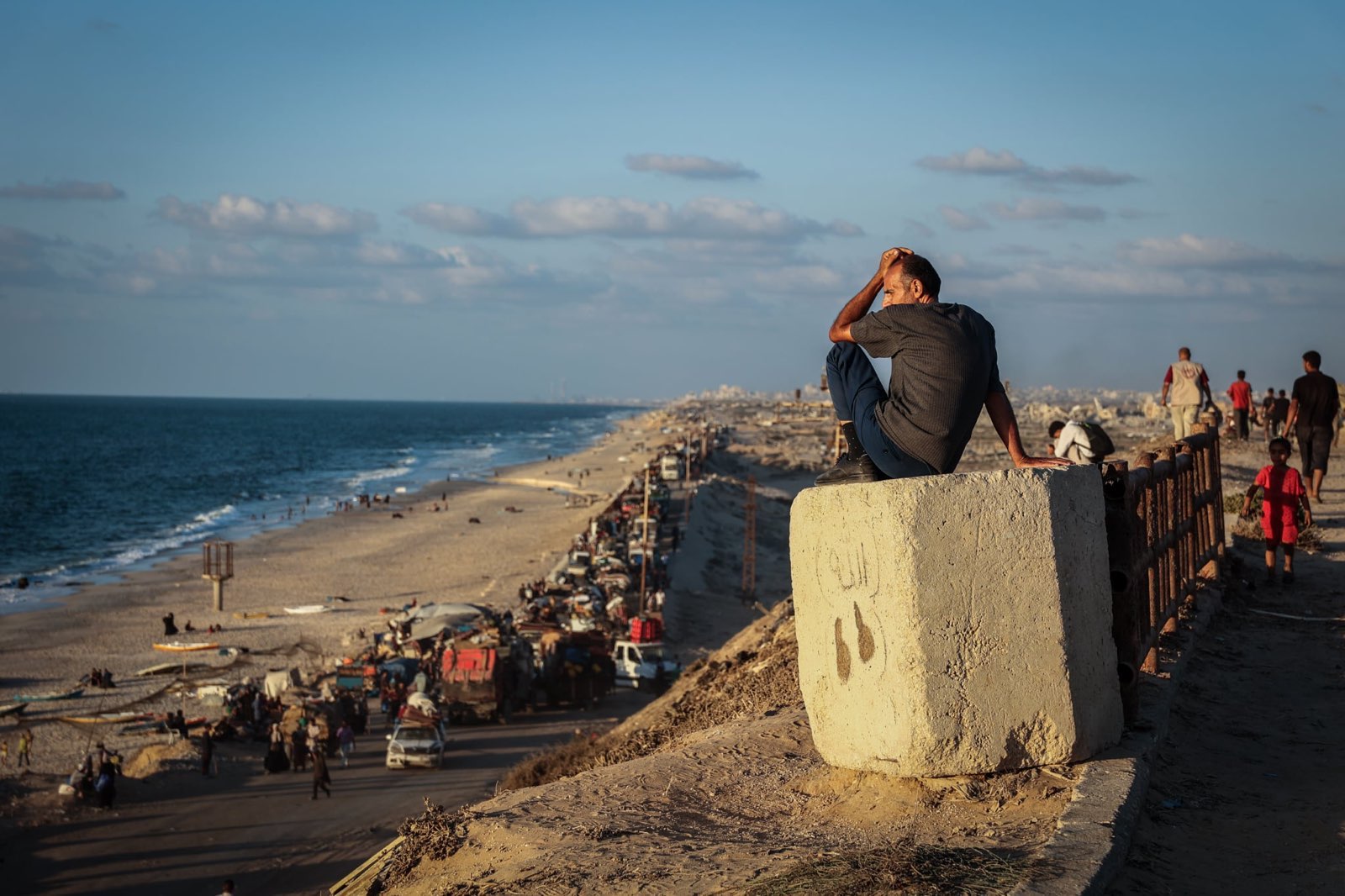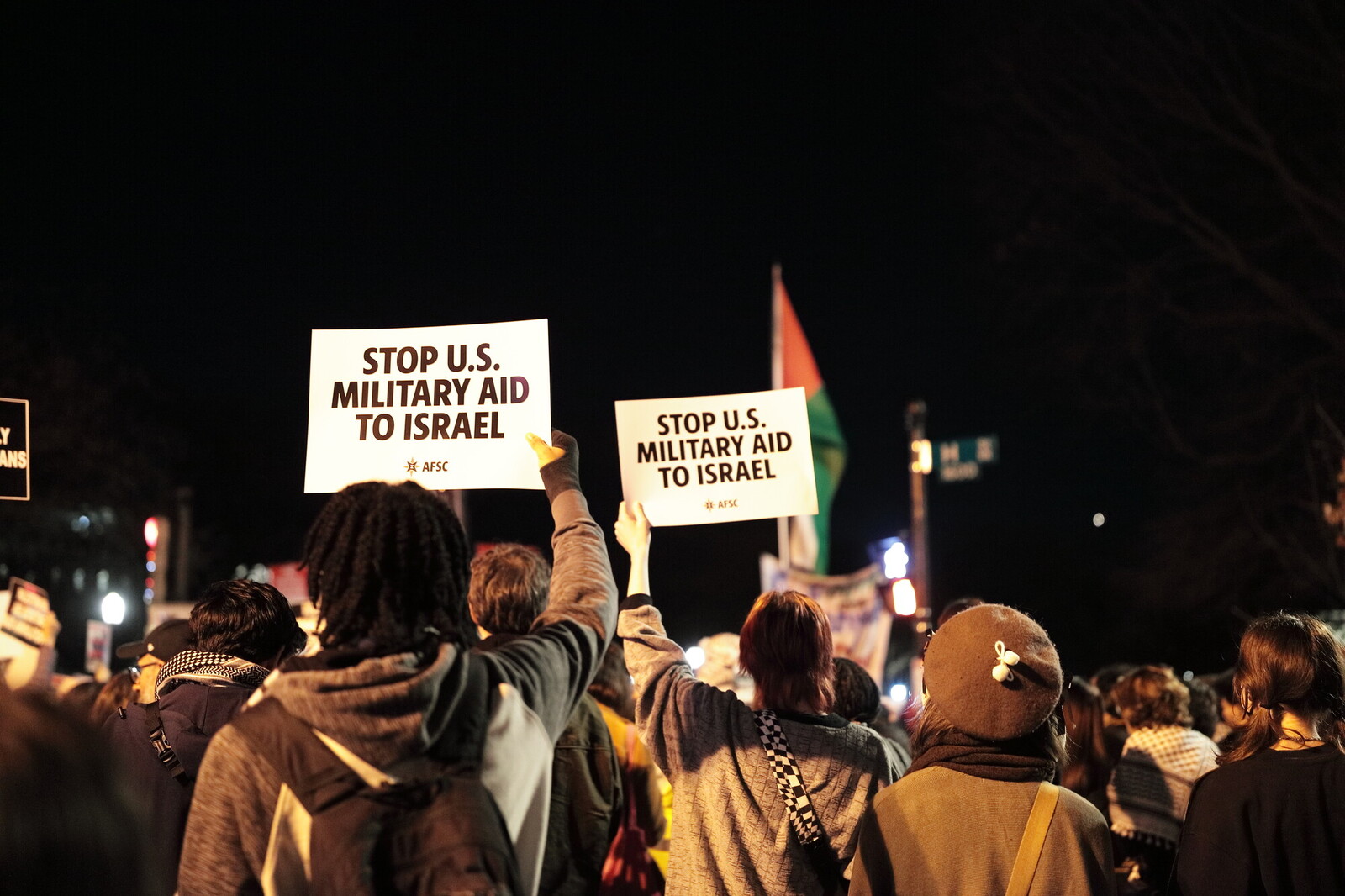
Ceasefire does not mean an end to Israel’s genocide. We must ensure the path toward justice and accountability.
After two years of genocide, a ceasefire agreement has been reached in Gaza. AFSC welcomes this critical first step while recognizing we must keep pushing for justice and accountability.
For two years, we have called for an end to Israeli attacks, the release of all people held captive, and full humanitarian access to Gaza. We are grateful to everyone around the world who has organized, protested, and demanded an end to the genocide—despite repression. And we stand with our staff and all Palestinians in Gaza who have survived the unimaginable.
One can't help but feel a sense of relief at the sight of Palestinian children playing and singing in front of their tents, celebrating this moment and hope for peace. While we embrace this agreement, it’s critical to recognize that the ceasefire does not mean the end of the genocide.
Here’s what you need to know about what happens next:
Life-saving food and medical aid must enter Gaza immediately: The famine in Gaza remains, and it is urgent that aid enters immediately without restriction. The medical system has been destroyed, and without urgent action, people will continue to die even if bombs are not falling. More than 67,000 Palestinians have been killed, and over 90% of homes and schools in Gaza have been damaged or destroyed. Action is needed to meet the needs of everyone who has been displaced, injured, and denied education.
Israel must completely withdraw from Gaza: Over 86% of Gaza remains occupied by Israeli forces within the Israeli-militarized zone, under displacement orders, or where these overlap. There cannot be an end to the war without Israel withdrawing from Gaza completely.
The blockade on Gaza must end: Israel’s blockade on Gaza began in 2007. It has prevented the movement of Palestinians, restricted the import of commercial goods, and denied fishermen access to Gaza’s waters. The impacts have been devastating. Even before the start of the genocide, 62% of Gaza’s population required food assistance, and 78% of drinking water was unfit for human consumption.
The mechanism of aid delivery matters: The U.N. Relief Works Agency is the organization most suited to deliver aid in Gaza. Despite facing massive cuts in funding from Israel and the U.S., UNRWA’s vital work continues. It is still administering the majority of medical services in Gaza and operating around 70% of shelters, which host an estimated 80,000 people.
Israel must adhere to the ceasefire agreement: Israel has violated every past ceasefire agreement, including in March of this year. In September, it also directly targeted and attempted to kill the Palestinian negotiating team in Doha, Qatar. Until there is a full Israeli withdrawal from Gaza and an end to occupation and apartheid, the risk of violence resuming will remain.
President Donald Trump’s plan for Gaza is dangerous: While the ceasefire is a step in the right direction, the president’s post-ceasefire plan is dangerous. It allows Israeli and U.S. developers to take over and control Gaza. And former U.K. Prime Minister Tony Blair—one of the leads of the 2003 U.S. invasion of Iraq—would be responsible for new leadership in Gaza. The rebuilding and authority of Gaza should not be in the hands of the U.S. or UK leadership. We must continue to push for Palestinian self-determination.
The U.S. must end all arms sales and military assistance to Israel: Those responsible for this genocide must be held to account. The U.S. must end all arms sales and take action to end its complicity in occupation, apartheid, and genocide.
Journalists must be protected and allowed entry into Gaza: Israel has prevented international journalists from entering Gaza for the last two years, while Israel has killed over 250 Palestinian journalists. Along with humanitarian aid workers, more journalists must enter Gaza, and the world must listen.
Israel must stop its illegal annexation of the West Bank and East Jerusalem: As the Israeli government continued its genocide in Gaza, it has continued its project of ethnic cleansing in the West Bank. Since January 2025, it has forcefully displaced 40,000 Palestinians from their homes in the West Bank through military violence and settler attacks. Israel is moving forward with its settlement plan, which would divide the West Bank in two, cut off East Jerusalem, and expand illegal settlement expansion.
Israel must release Palestinians who remain in its prisons: Over 11,000 Palestinians remain in Israeli prisons, over 3,500 of them in administrative detention. The majority are held without charge—without trial or due process—and are subject to documented torture and abuse. Since October 2023, there have been at least 77 Palestinians killed in Israel’s prisons.
The U.S. and Israel must be held accountable: The U.S. has sent over $30 billion of arms to Israel since October 2023, and just weeks ago, Trump announced another $6.5 billion package to Israel. Congress must use its responsibility of congressional oversight to enforce U.S. law, including the Leahy law, which prohibits the use of U.S. funding for any foreign security forces committing gross human rights violations.
A ceasefire is just the start. To bring true justice, Israel’s occupation and apartheid must end. The U.S. must end all arms sales to Israel and hold the Israeli government accountable. Palestinian self-determination is not negotiable—it is a fundamental right that must be upheld.
